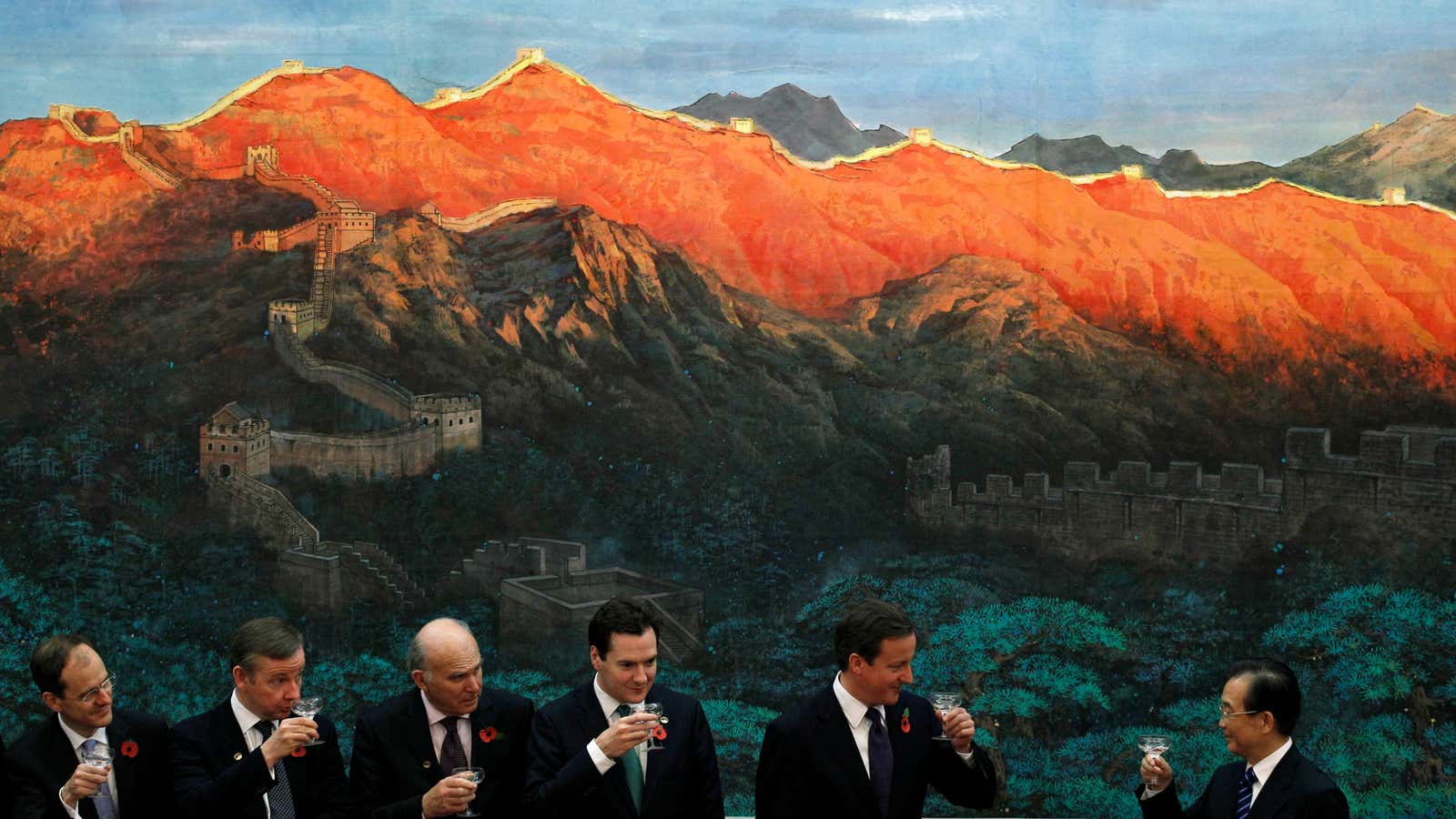The UK is set to build its first new nuclear power plant in more than a generation thanks to a deal with France’s EDF Energy and two Chinese nuclear giants. This is the latest multi-billion dollar deal the UK has sealed with China in a matter of months.
The investment raises the question whether the UK has become dependent on China to keep its lights on, and keep its economy humming.
UK prime minister David Cameron was thrilled about signing the nuclear power station deal. He hailed the job opportunities and the energy security the deal would bring—the new nuclear plant could reduce energy bills by more than £75 ($120) a year in 2030.
Despite the government’s praise, British trade union GMB said it’s not a good sign if a country’s energy sector requires financial aid from abroad. “It shows Britain is unable to determine its own energy strategy and therefore gets forced to turn towards foreign investors,” said Gary Smith, the GMB’s national secretary for British energy.
Other UK energy firms with Chinese stakes include Talisman, which China’s Petrochemical Corp bought a 49% stake in last year; Emerald Energy, which is fully owned by Sinochem Group, China’s fourth largest petrochemical corporation; and Ineos, which PetroChina, China’s largest oil and gas producer, holds a 50% stake in.
What’s more, China’s investments in the UK in the past six months aren’t limited to energy firms.
Earlier this month, a Chinese billionaire announced that he’ll spend $810 million on rebuilding London’s Crystal Palace, the world’s largest glass and steel building in Hyde Park that burnt down in the 1930s. The Chinese property developer ABP signed a deal in May to revive London’s Royal Albert Dock, once the center of UK trade before the arrival of large container ships, and turn it into the city’s third financial district. And Wanda, the Chinese property group, is going to build a luxury hotel on London’s “new South Bank” site, as part of a £700 million ($1.1 billion) investment in the city.
Suwei Wang, partner of the China Business Group at PricewaterhouseCoopers, told Quartz that the UK should not fear becoming dependent on Chinese investments. “The UK has traditionally been an open economy. One of the strengths of the UK economy is its ability to draw on the opportunities of the global economy, and serve as a platform for the global economy.”
Wang argues that the recent surge in Chinese investments is the result of the London 2012 Olympics. “The UK successfully organized the games, which showed China how open the UK economy is.” She expects the investment wave to continue, especially following finance minister George Osborne and mayor Boris Johnson’s visit to China last week.
During this visit Osborne said China’s new appetite for investments in the UK should be embraced as an opportunity, not hailed as a threat.
The UK is currently China’s top investment destination in Europe, according to Heritage Foundation. Since 2005, China has invested up to $17.8 billion in the UK compared to $9.2 billion in France, the second highest recipient of investment in Europe.
In his book Why China is not buying the world, Peter Nolan, professor of Chinese development at Cambridge University argues that the world should not fear that it’s being bought by China. So far, China has been unsuccessful in developing globally competitive companies with leading global technologies and brands. Its powerful multinationals are owned by the government, and are focused on commodities, construction, banking, transportation, and telecommunications. These firms make use of technology products, rather than producing them. There are only 23 Chinese companies in the FT 500, which is why Nolan argues that “we are inside China, but China is not inside us.”
The UK is going to considerable lengths to get China’s financial backing. Since investments focus on construction projects and the energy sector—and help fuel the UK’s economic growth by creating jobs—it’s currently a win-win situation. If China however continues this pace, the UK economy could actually become dependent.
